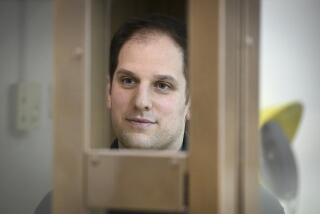Beating the Soviet System
Iosef Shmuelovich Shklovskii, an astrophysicist, was a rarity among Soviet scientists. He was Jewish and a critic of the Moscow authorities, but was so valuable to their scientific and military efforts that he got away with it--mostly. Though he was not sent into exile or to a mental hospital, as many of his colleagues were, Shklovskii, who died recently, was not allowed to leave the Soviet Union for many years because of his outspokenness. Only after he had reached an understanding with the authorities that he would be less outspoken was he allowed to travel abroad.
Shklovskii’s contributions to understanding the physics of distant stars put him into the front ranks of the field. His students included virtually all of today’s leaders of the Soviet planetary space program. He was a maverick, he was independent and he had a speculative turn of mind. These attributes served him well in astrophysics and led him to argue for the existence of extraterrestrial life--views for which he is well known in this country. His independence also led to conflict with the state.
From 1946 to 1966 Shklovskii was not allowed out of the Soviet Union. “He was a warm-hearted, passionate, outgoing personality who was very independent minded, and he just loved to speak his opinions and interact with colleagues,” recalls Leo Goldberg, former director of the Kitt Peak National Observatory and the Harvard Observatory, who met Shklovskii in Moscow in 1958. “You can imagine how hard it was for him to have to restrain himself and to be deprived of personal contact with colleagues for so many years.”
In the 1970s Shklovskii’s passport was lifted, and he was again not permitted to leave. His failure to appear at meetings of the International Astronomical Union coincided with a letter that he had written in support of Andrei Sakharov after 40 Soviet academicians signed a letter condemning the dissident physicist.
But by 1979 Shklovskii was again allowed to travel to a meeting in Montreal. “He told me that he thought Sakharov was a truly great man, a great scientist and a great human being,” Goldberg says. “We asked him about the rumor that he hadn’t come to Grenoble in 1976 because of illness.
“He grinned and said, ‘Yes, I was ill. I had diabetes. Too much Sakharov.’ ”
We hope that his spirit as well as his knowledge continues to inspire his colleagues. Even in the Soviet Union, some people can fight city hall.
More to Read
Sign up for Essential California
The most important California stories and recommendations in your inbox every morning.
You may occasionally receive promotional content from the Los Angeles Times.










